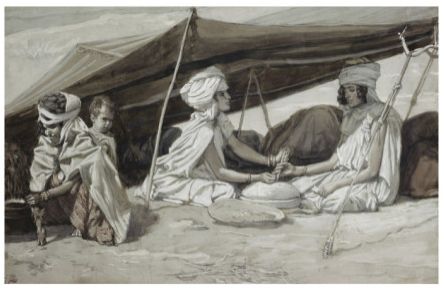
Leah
“…bury me with my fathers…. There they buried Abraham and Sarah…Isaac and Rebekah…and there I buried Leah” – Jacob in Genesis 49:29-31
The morning after Jacob lay with me
even my weak eyes saw his anger.
When I give him a son
he will love me.
Even my weak eyes saw his joy
at the births of Reuben and Simeon
will he finally love me
after Levi, Judah?
At the births of Reuben and Simeon.
Rachel brooded.
After Levi, Judah
she fumed and schemed.
Rachel brooded
bargained for my son’s mandrakes.*
She fumed and schemed
at Zebulun—my sixth!
The bargained-for mandrakes
have produced a son at last.
Zebulun, my sixth
followed by Joseph, Rachel’s first.
Have produced a second son—her last.
She died birthing Benjamin
who followed Joseph, Rachel’s first.
Still Jacob doesn’t love me.
Though she died birthing Benjamin
and I gave him six sons
still Jacob doesn’t love me
though forever now Jacob lies with me.
– Violet Nesdoly – January 2013
*******************
This bittersweet love poem is from a new project I’ve begun: writing poems about the women in the Bible.
You may know the story of Leah. She was the oldest daughter of Laban and sister of Rachel. Rachel was beautiful and Jacob, son of Isaac and Rebekah, fell in love with her, then worked seven years to earn the right to marry her. But on the wedding night, the girls’ father (Laban) switched Leah (who is described as having “weak eyes”) for Rachel, telling his disappointed son-in-law the next morning that it wasn’t customary to give the younger daughter in marriage before the older one was married. A week later Laban gave Rachel to Jacob as a second wife on the condition Jacob would serve him another seven years. The jealousy and friction in that home are well documented in Genesis.
The voice in the poem is Leah’s from beyond the grave. And maybe she’s wrong. Maybe Jacob did come to love her, seeing that he chose to be buried near to her and not Rachel.
This poem is based loosely on Adele Kenny’s prompt about the old becoming new again. I chose the pantoum form because it literally circles back to the beginning.
(*Mandrakes were thought to be an aphrodisiac. In the story, Leah’s oldest son brought them to his mother, but Rachel persuaded Leah to give them to her in exchange for a night with Jacob.)
 This poem is part of Poetry Friday, hosted today by the wonderful Linda at Teacherdance.
This poem is part of Poetry Friday, hosted today by the wonderful Linda at Teacherdance.


What a great idea. It’s definitely one of the most perplexing bible stories. Beautifully done too, Violet.
LikeLike
Beautifully written, Violet! I look forward to reading more of these.
LikeLike
I like the sound echoes–Simeon…schemed….Judah….brooded…. the assonance in that stanza nicely alludes to the sounds of grief, shock (eee, ooh). I also like the resonance of first / last, leading to the ongoing questions about what it means to be first and last, and which of the states is more blessed.
Difficult topic–Rachel & Leah. I’m glad you didn’t opt to write an easy poem with easy answers. I think the Pantoum is a great form for exploring topics that are not easy to resolve.
LikeLike
Thanks so much, Catherine, Iza and Tracy!
Tracy, I so appreciate your close reading. What a gift to give detailed feedback like that. And I do love the pantoum form, especially for some topics, as you say.
LikeLike
The repetition in this form really fits the subject. Very meditative. I am looking forward to more in this series!
LikeLike
Leah has such a heartbreaking story. You’ve done a wonderful job with it!
LikeLike
Thanks so much, Andi and Ruth. Leah’s story both fascinates and horrifies me both. Imagine being in a relationship where you know from day one that you are a disappointment.
LikeLike
Or knowing that you “must” be a bargain in your family’s eyes after your father gives you away. You inspire me every time, Violet, with your expertise in word style. This is lovely. I used to work at the pantoum with my students-an interesting form for some topics. Thank you!
LikeLike
Fascinating poem, and equally interesting comments!
LikeLike
Great idea, and a thought-provoking poem. There are some trememndous women in the bible waiting for their own poems, like Sarah, Ruth, Queen Esther, and many more.
LikeLike
Thank you Matt! I agree, there are many female characters in the Bible that would yield interesting poems. It’s a fun project (not exactly “The Next Big Thing,” but one of my next things) 🙂
LikeLike
I think it could be a VERY big thing!
LikeLike
Dear Violet, I look forward to your new poems. Always so well-written. Blessings, Ellen
LikeLike
Thank you Ellen! Much appreciated. (Always enjoy your work in ‘Time Of Singing’)
LikeLike